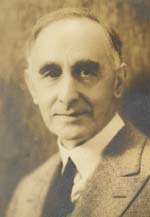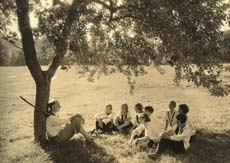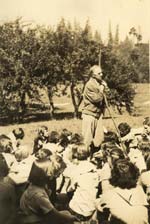
|

|
| Uncle Toby (1871-1942) |
Any camper who has attended even a single week of camp at Namanu has heard of Uncle
Toby and will recall the fun evenings spent in "Uncle Toby’s Storyhouse." No other leader in the history of the
Portland Area Council of Camp Fire has had so significant an influence on the traditions and legends of Camp
Namanu. Now, nearly 60 years since his death, his vision for camp can still be easily seen. The beloved Uncle Toby
was an adventurer, a philosopher and a lover of youth.
Theodore Acland Harper was born December 17, 1871, in Christchurch, New Zealand. He was born into a prominent New
Zealand family of nine children. In a brief autobiography published in 1924 in The Oregon Journal, he describes
his siblings as "the first generation of white children in that part of the world." His grandfather, Henry John
Chitty Harper, came to New Zealand to serve as the first Bishop of Canterbury Province. Theodore’s father, Leonard
Harper, a lawyer, was the first president of the New Zealand Alpine Club. Theodore’s mother was Joanna Dorothea
Dyke Acland, thus the source of his middle name.
Growing up in affluence on his family’s plantation, the "Ilam," at Riccarton, New Zealand, provided the horseback
experiences that would later be the inspiration for his book, Windy Island.
His four brothers all became quite successful and from an early age Theodore saw himself as an outcast from his
family. Always an adventurer and a dreamer, he wasn’t willing to conform to his family’s more traditional
expectations.
After attending Christ College Grammar School in 1895 he proceeded to the School of Mines at New Zealand
University where he graduated in 1897. His schooling in mining provided the means for his many adventures. Soon
after graduating, Mr. Harper began his travels as a sailor before the mast.
His travels aboard ship as a deckhand only lasted about six months, he arrived in London with only $17 in his
pocket. He then began a series of mining activities that carried him around the globe for the next fourteen years.
His first job took him to the desert of Arizona in 1898. By the spring of 1900 he was on to Camp Nome, Alaska;
this was the year of the great Alaskan gold rush. Finally, he was ready for his grandest adventure of all to
Siberia in 1902.
Uncle Toby was put in charge of a mining concession in Eastern Siberia along the Amur River. He learned the
language and lived there eight and a half years--carrying on through the Russo-Japanese War and the revolution
that followed. Several of his books are based on these years. Siberian Gold introduces characters that are
familiar to Namanu campers such as Kubrik and Hisnik. His responsibilities in Siberia also took him to Japan,
Mongolia, China and twice to London. During this second trip to London, he married Winifred Mary Hunter-Brown on
November 8, 1908. Immediately after the wedding they returned together to Siberia.

|
| Uncle Toby telling stories under a cherry tree in the meadow |
Next, they were off to Central America in the summer of 1909. The area of the Yucatan Peninsula provided
inspiration for his book Forgotten Gods. He returned to Alaska along with Winifred in 1910. After two years in
this cold and rugged territory, the Harpers were ready to settle down.
First they tried their hand at prune farming west of Salem. Upon the entry of America into World War I, the
Harpers moved to Portland and he devoted himself to local Red Cross work, until 1924. It was at this point that
his career as a writer began.
Sometime in the winter of 1924-25, through the influence of his fellow New Zealander, Edith Kempthorne "Alaska,"
Uncle Toby became involved with Camp Fire. He teamed up with Daddy Raker, expertly fulfilling the role of "story
teller" and "dreamer."

|
| Uncle Toby telling stories in the meadow |
"I can see Uncle Toby as he leaned on his big long staff telling stories around the camp fire at night. From time
to time he would poke the fire with his staff and the sparks would fly up."
-Lucy Crossett
Throughout Uncle Toby’s later years, his devotion to the work of Camp Fire was unsurpassed at both the local and
national level. He was a member of the Board of Directors of both the Portland Council and the National Board of
Camp Fire Girls. He delivered several addresses at its National meetings. In April 1927, he received the Wohelo
Award, the highest honor given on a national basis for Camp Fire.
During his final years, he lived in Portland at 3055 NW Vaughn Street. Theodore Acland Harper died in Portland,
at Good Samaritan Hospital, on May 6, 1942, following a short illness.
Full-unabridged text of this chapter is available in the 75th Anniversary Book which is for sale at the
Camp Fire USA Portland Metro Council's office in Portland.
©1998 Reprinting only with written permission of Camp Fire USA Portland Metro Council.
|